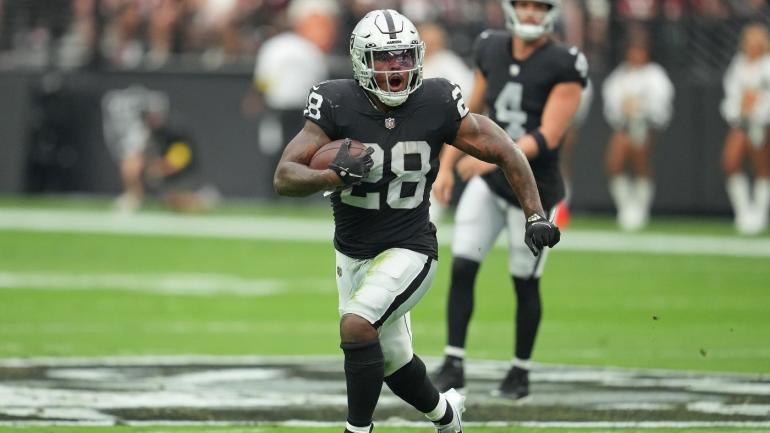Josh Jacobs holdout: How we got here, what the future holds and what it means for Raiders
The Raiders need Jacobs to win games, but can the two sides reach an agreement?

Running backs aren't getting paid in the NFL, yet the one back that appears to have leverage is Josh Jacobs. With Saquon Barkley not receiving a significant pay raise after a two-week negotiating period with the New York Giants, the Las Vegas Raiders and Jacobs are front and center.
Jacobs wants a long-term deal from the Raiders, who decided to place the franchise tag on him for 2023. The deadline for a long-term deal has passed, giving Jacobs two options for this season -- play on the $10.091 million franchise tag or rework a one-year deal with the Raiders for more guaranteed money before going through this process again in 2024.
Jacobs already has two Pro Bowl selections and two seasons rushing for double-digit touchdowns. Jacobs was the first player in franchise history to win rushing the title since Marcus Allen in 1985, rushing for 1,643 yards and 12 touchdowns -- and his 2,053 total yards from scrimmage also led the league. He has three 1,000-yard campaigns in his four seasons, while being fourth in the league in rushing yards (4,740) and tied for third in rushing touchdowns (40) in that span.
If there's any running back that deserves to get paid, it's Jacobs. Yet a long-term deal won't be reached until 2024 with the Raiders (or with another team). How did Jacobs get to this point with the Raiders and is there an end in sight?
How the Raiders failed to sign Jacobs
The Raiders had plenty of opportunities to reach a long-term deal with Jacobs prior to his free agency, which all started with not giving Jacobs the fifth-year option for the former first-round pick back in 2022. Jacobs could have received around $8 million for 2023 if the option was exercised, but instead used the decline as motivation for his next deal.
All Jacobs did was lead the NFL in rushing and yards from scrimmage, forcing the Raiders to act. Las Vegas did, slapping the franchise tag on Jacobs and giving him $10.091 million guaranteed if he signed the tender. Jacobs would be getting a significant pay raise compared to the fifth-year option had the Raiders given that to him last year.
The Raiders also bought themselves more time to reach a long-term deal with Jacobs, but both sides couldn't come to an agreement by the franchise tag deadline in July. Jacobs has refused to sign the tender and plans to hold out through the 2023 preseason. He hasn't been around the facility in months -- hoping for a long-term deal that never came.
This all stemmed from the Raiders declining the Raiders' fifth-year option in 2022. Jacobs isn't letting Las Vegas forget that decision either, being betrayed because his play on the field last season warranted a long-term contract.
Why Jacobs has leverage
Even though the running back position is devalued, Jacobs was the best one at his position in 2023. Not only did Jacobs lead the league in rushing yards and yards from scrimmage, but he's only 25 years old and his prime years are ahead of him. Jacobs had his best season rushing the ball and catching the football (career-high 53 receptions for 400 yards in 2022), and is showing no signs of slowing down over the next few seasons.
The Raiders aren't a good football team, needing Jacobs to win football games in 2023. Las Vegas was 5-1 when Jacobs rushed for 100-plus yards last season and 6-3 when Jacobs finished with 20-plus carries. If Jacobs does decide to pass up on game checks, the Raiders have Ameer Abdullah and Brandon Bolden as his replacements on the roster.
Jacobs has a few options here. He can accept the franchise tender and take the pay raise from what would have been his fifth-year option, hold out and sit out the season while the Raiders lose games in the process, or force a trade (even though a long-term deal can't be reached). Since a player with an unsigned tender can't be traded until under contract, he essentially has veto power on where he is being dealt or at all.
Jacobs could refuse to ever suit up for the Raiders again. Las Vegas can rescind the franchise tag, allowing Jacobs to go wherever he desires and seek a long-term deal or Jacobs can simple force a trade by agreeing to a revamped deal in order to facilitate a trade (basically take less money to get his way out).
Jacobs doesn't have to play for the Raiders. Let's see if money talks.
Can the Raiders and Jacobs patch things up?
Saquon Barkley could have set a president for Jacobs by holding out in terms of a bigger deal. Instead, Barkley decided not to hold out long and agreed to a new one-year deal with a slight pay raise of up to $11 million (up from the guarantee of $10.091 million).
Barkley only had $909,000 worth of incentives, but that's if he gets 1,350 rushing yards plus a playoff berth, 65 receptions, and 11 total touchdowns. The Giants can even tag Barkley again after the season, so the deal he struck wasn't exactly in his favor.
Jacobs may play harder to get here. If the Raiders do want to give their running back a one-year deal with incentives, they'll have to give him a significant pay raise with incentives attached to it to make Jacobs happy. A restructure doesn't save the Raiders any cap space at this point, but it does make Jacobs happy.
Barkley's deal with the Giants didn't exactly help the Raiders and Jacobs get any closer towards working out a deal. The reworked deal devalued the running back market and potentially drifted Jacobs and the Raiders further apart.
Where do both sides go from here?
Jacobs hasn't reported to training camp and won't report to the team any time soon. Only playing on a one-year deal doesn't help Jacobs at all, unless the Raiders cave and offer him a significant pay raise.
The Raiders can only hope Jacobs shows up towards the end of the preseason and plays under the franchise tag of $10.091 million. Las Vegas can just reach out to Jacobs and give him a huge pay raise in 2023 to make him happy, along with eliminating the ability to franchise tag him in 2024 so Jacobs can seek out that long-term deal after this season.
Let's see who caves first: Jacobs or the Raiders.


















